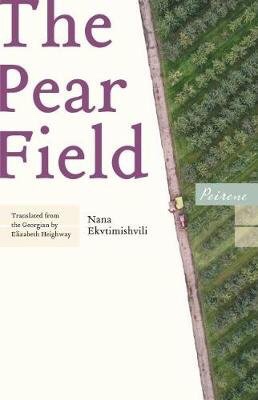
Translated from Georgian by Elizabeth Heighway
The idea of walking through the warm diffused sunlight of a pear orchard, plucking sweet ripe fruits from the branches is one that fills me with delight, and so I was quite shocked at the image that Ekvtimishvili presents.
Between the wash block and the dormitories there’s a wide green field covered in small pear trees. Everyone, young and old, stays well away. the trees produce pears every year without fail and everyone stays away from them too, for the lovely green field is permanently mired in water. Whether it’s water flooding in from a broken pipe or rising up from an underground spring, nobody knows. At first glance, the water seeping up through the soil is barely visible. The field looks so enticing, especially to new arrivals at the school, who run out onto the field and then slow involuntarily, ominously, as their feet sink into the waterlogged soil. So the pear trees just stand there with their knotted trunks and tangle of low-hanging branches, alone and forsaken, and every spring they bring forth large, shiny green pears which nobody touches. The pears rarely ripen, before the weather turns cold but instead remain rock-hard; those that do ripen never turn sweet but bear the taste of the peculiar groundwater that seeps into their flesh.
This is obviously an extended metaphor for – amongst many other things – the dashed expectations of the “new arrivals at the school”. Not that these are young eager kids looking forward to the delights of a fine education. Rather these are the new residents at the Residential School for Intellectually Disabled Children. There’s nothing wrong with the intellect of most of these kids, who are there simply because the children’s homes are full. However, they are emotionally scared, having been handed over to state care by their parents. That would be care in quotation marks. Given that there isn’t even the money to keep the building in a safe state of repair, what chance is there of a nurturing education? The kids will though become expert in violence and neglect.
Children whose families have relinquished their rights entirely (i.e have provided written confirmation that they have no intention of reclaiming them) can be adopted. This seems to be the only exit path, unless they reach the age of 18, when they are free to leave. Lela, however, has nowhere to go and stays on, becoming a kind of car park assistant. (In order to generate income, the school allows neighbouring residents to park overnight on the grounds.) Her plans for the future include securing adoption for the young boy, Irakli, and the death of one of the teachers!
Let’s start with the second plan first. In the course of the narrative Lela reveals the sexual abuse to which she has been subjected over the years As a result she has hardened into someone who can take care of herself. Yet when she sees the same thing happening to other young girls and blind eyes still being turned, she becomes enraged. As for the adoption of Irakli, this is another crusade engendered by the mental torture inflicted on him by his mother, who continues to pretend that she will come and reclaim him just as soon as circumstances allow. This almost casual cruelty has got to stop! Do her plans succeed? One does, one doesn’t. I’m saying no more.
I’m not sure that enjoy is the right word to describe this reading experience. It was shocking (though not in the sense of awful); certainly no stroll through my imaginary orchard. One of the biggest shocks was the timescale. The Pear Field isn’t set during the days of communism, but in the newly independent Georgia of the early 1990s.
Ekvtimishvili is a film director and her understanding of visual impact shows. I loved the opening sequence, panning over the Tbilisi suburbs, down onto Kerch Street (the naming of which is a story all of its own) and into the school itself. I appreciated the literary qualities of the pear field metaphor (eventually) and the smoking gun of the crumbled balcony. Seedy reality is presented at times in graphic detail and at others more allusively. (I preferred the later.) I didn’t approve of some of Lela’s choices, but these are a consequence of her upbringing. That she is one of those “large shiny pears … bearing the taste of the peculiar groundwater that seep into their flesh” should really come as no surprise.

Peirene Press was founded in 2010, and specialises in high-quality first-translations of contemporary European novellas less than 200 pages long. They pride themselves on publishing truly big stories in small packages.
The Pear Field is a case in point, another memorable read from the most consistent of independent publishers. Also a popular choice for #readindies month. Further reviews at ireadthatinabook and 1streading.
Hi Lizzy, I found the pear field metaphor a little obscure but this was just a minor reservation in an immensely powerful short novel, cleverly plotted, heart rending yet upbeat too especially in Lela’s instinct for survival.
Thanks for the link. I thought this contained a nice balance between the grim reality and liveliness of the characters, even including moments of joy.
Peirene bring out some wonderful books, but they aren’t always easy to read. I think I would have struggled with this right now – maybe one day…
A lot of people found this too bleak, but given the setting, I found it surprisingly upbeat…
…maybe that’s just me!